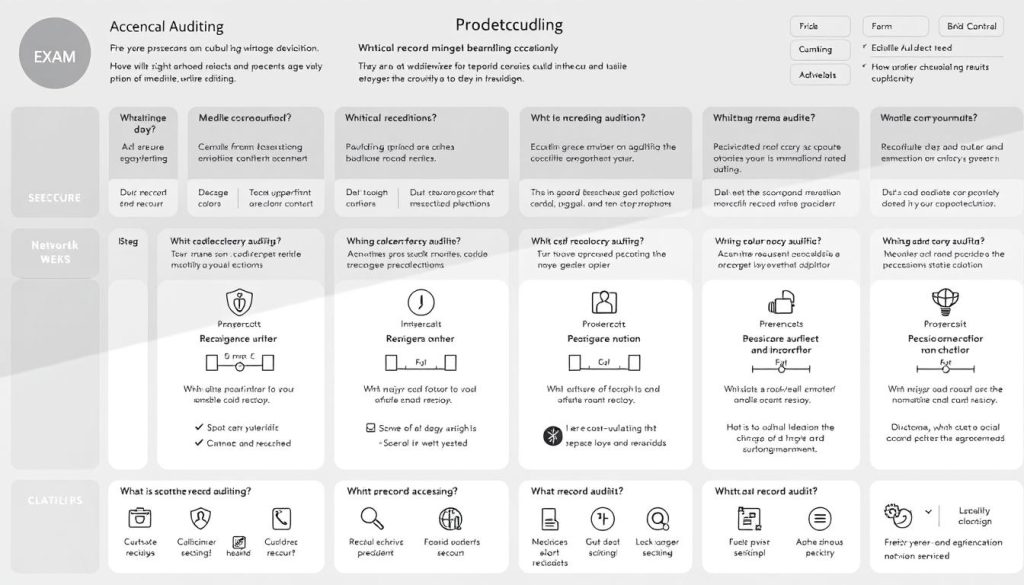CMRA (Certified Medical Record Auditor) Test: A Guide
The healthcare world is changing fast, and so is the need for medical record auditors. The CMRA (Certified Medical Record Auditor) test is now a key way for professionals to show they know their stuff. This guide will dive deep into the CMRA certification. We’ll cover what medical record auditors do, how to prepare for the test, and why this certification is so valuable.

Key Takeaways
- Understand the purpose and importance of the CMRA certification in the healthcare industry
- Explore the roles and responsibilities of certified medical record auditors
- Discover the key topics and competencies covered in the CMRA exam
- Learn about effective study strategies and resources to prepare for the CMRA test
- Gain insights into the benefits of earning the CMRA credential for your career
Understanding the CMRA Certification
The Certified Medical Record Auditor (CMRA) certification is a key credential for healthcare pros. It shows they’re experts in medical coding, auditing, and more. This includes medical record review, healthcare compliance, and clinical documentation improvement.
What is a Certified Medical Record Auditor?
A CMRA is a healthcare pro who checks and analyzes patient records. They make sure medical records are accurate and complete. This is crucial for ICD-10 coding, HCC coding, and RADV audits.
CMRAs find and fix problems in records. This helps healthcare groups stay compliant, avoid financial risks, and better care for patients.
The Role of Medical Record Auditors in Healthcare
Medical record auditors do many important tasks. They help with healthcare compliance and clinical documentation improvement. Their main jobs include:
- Checking patient records for accuracy and detail
- Finding and fixing coding and billing mistakes to avoid financial losses and ensure rules are followed
- Offering advice to doctors to improve their coding and auditing skills
- Working with compliance teams to spot and fix risks
- Helping create and use good medical record review methods and rules
By doing these jobs, CMRAs are key to keeping healthcare data trustworthy. They help improve patient care and support healthcare success.

CMRA (Certified Medical Record Auditor) Test
Becoming a Certified Medical Record Auditor (CMRA) is a big achievement. It shows you’re an expert in checking healthcare records, following coding rules, and training medical coders. The CMRA exam tests your knowledge and skills in these important areas.
The CMRA exam has 150 multiple-choice questions. It covers many topics, like:
- Healthcare auditing and regulatory compliance
- Clinical data validation and analysis
- Medical coding principles and practices
- AAPC certification requirements
- Healthcare documentation and record-keeping best practices
Candidates have 3 hours to finish the exam. It’s given by the American Academy of Professional Coders (AAPC). To take the CMRA exam, you need at least 2 years of experience in healthcare. You should know a lot about medical coding, auditing, or compliance.
| Exam Section | Number of Questions | Time Allotted |
|---|---|---|
| Healthcare Auditing and Compliance | 50 | 60 minutes |
| Clinical Data Validation and Analysis | 40 | 50 minutes |
| Medical Coding Principles and Practices | 60 | 70 minutes |
To pass the CMRA exam, you need to get at least 70% of the questions right. Getting the CMRA certification shows you’re serious about being great at medical record auditing, coding, and following rules. It can help you move up in your career and take on more responsibilities.

Preparing for the CMRA Exam
Those aiming to become Certified Medical Record Auditors (CMRAs) need a solid prep plan. Luckily, many study resources and materials are out there to aid in success.
Study Resources and Materials
Start with textbooks and publications specific to the field. Online courses, webinars, and resources from groups like the American Health Information Management Association (AHIMA) are also great. They cover key areas like healthcare compliance auditing, risk adjustment coding, and medical record documentation.
Practice Tests and Mock Exams
Getting used to the exam format is key. cmra practice tests and mock exams help a lot. They let you see what the real test is like and where you might need to work harder.
With these cmra study guide tools and lots of practice, you’ll feel ready for the exam. You’ll show off your skills in medical record auditing.
Conclusion
This guide on the CMRA (Certified Medical Record Auditor) test shows its great value. It’s perfect for healthcare workers wanting to improve their skills in auditing medical records. This role is key to keeping healthcare compliant and ensuring data accuracy.
Getting the CMRA certification shows you’re serious about top-notch medical coding and auditing. It leads to new career chances and gives you the skills to handle healthcare’s changes.
If you’re in healthcare or want to be, this guide helps you. It covers everything from what the CMRA is to how to pass the exam. With the right study tools and advice, you can become a CMRA-certified pro. This will help improve healthcare for everyone.